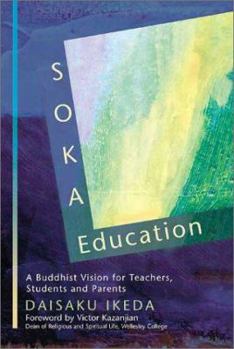Soka Education: A Buddhist Vision for Teachers, Students & Parents
Select Format
Select Condition 
Book Overview
From a Japanese word meaning 'to create value', this book presents a fresh spiritual perspective to question the ultimate purpose of education. Rather than offering practical classroom techniques,... This description may be from another edition of this product.
Format:Hardcover
Language:English
ISBN:0967469740
ISBN13:9780967469744
Release Date:May 2001
Publisher:Middleway Press
Length:208 Pages
Weight:0.94 lbs.
Dimensions:0.9" x 6.1" x 8.4"
Customer Reviews
2 ratings
Value education. A book on Education's restoration of Value.
Published by Thriftbooks.com User , 21 years ago
Soka means Value. This book teaches the great importance of human interaction and relationship between the mentors and mentees of today's academic institution. Soka Gakkai President Ikeda strongly encourages the reader to understand that the value of Education as for others to learn and benefit from that which they learn. He expounds the one truth of Students to respect their teachers for their inputs just as teachers respect their students for their efforts. Mr. Ikeda distinctly explains the necessary steps and practice to keeping Value in education, as he is inspired by his mentor Josei Today, and the first president of Soka Kyoiku Gakkai, Mr. Makiguchi who was a humanistic educator and a strong advocate for peace. Purchase this book today and find great value in teaching others in all aspects of life, not just in schools but in all institutions of society. Go Soka!
Illuminating Insights for School Reform
Published by Thriftbooks.com User , 23 years ago
Daisaku Ikeda is a prolific author who presents a Buddhist perspective on a vast array of topics. His message is that people have boundless creative potential for bringing about positive change. His works are always uplifting. Soka Education is no exception. It offers clear guidelines for educational reform. The focus is not on pedagogical strategies, but on fundamental issues such as the purpose of education, the qualities of great educators, causes and solutions of teen violence, and the need to foster global citizens. Where teachers, administrators, politicians, and parents apply the wisdom of this book, schools will become more humane places and young people will blossom.The Japanese term "Soka" means creative, contributive living; Soka Education is education that empowers students, enabling them to lead happy, fulfilled lives. Ikeda objects to using schools to serve nationalistic or corporate ends. Japan did so throughout the past century, and is now suffering the consequences. To counter that trend, Ikeda has founded "Soka schools" in Japan (kindergarten through university) and elsewhere that are characterized by joyful, enthusiastic students; wise, affectionate teachers; and a prevailing belief that every student has a unique and important role to play in the world. I have visited many of those campuses; no experience has ever given me greater cause for optimism about the future. The current thrust in the USA is to gear instruction toward raising standardized test scores. This is a step away from placing students' interests and needs first. In Soka Education, Ikeda calls for "a society that serves the essential needs of education." In contrast to this notion, American society, with politicians leading the fray, heaps blame and abuse on teachers. What's worse, the schools most in need of support-inner-city schools, for example-come under the harshest attacks. To counter the dark, conservative mood that holds sway in the USA and other countries, hopeful, practical prescriptions are needed. Soka Education provides these in abundance. To take one example, Ikeda discusses the problem of juvenile delinquency. While the phenomenon results from an erosion of human bonds characteristic of our age, he says, educators can connect, life to life, with troubled youngsters and lead them on a path toward creative, rather than destructive, living:"If these bonds are severed, the human spirit can only roam aimlessly in the pitch darkness of solitude. . . . It is the responsibility of adults to patiently restore the ability to communicate by listening to the voices of isolated children calling out for help from the darkness. There is a famous episode involving Socrates in which his influence on youth is described as being like an electric ray that stings those who touch it. He explains that he can electrify others because he is electrified himself. Similarly, teachers must constantly be creative if they are to evoke creativity in thei





